#childhood emotional abuse
Text
Nobody is “too young” to be cynical or jaded or hate their life. There is no appropriate age for that. If someone is experiencing that at any age, their mental health is at risk. Doesn’t matter how young they are, or how easy their life seems. Just because existential dread didn’t hit you until later in life, doesn’t mean everyone else gets to be so lucky.
“You think life sucks now? Just wait until you’re grown” okay grandpa what if they don’t make it to adulthood? What if it gets worse until they only see one way out and they take it? Stop being dismissive. Stop forcing your problems onto young people and start taking them seriously about things. Period.
(Inspired by this post)
#childhood trauma#adverse childhood experiences#depression help#childhood depression#late diagnosis#child advocacy#neurodivergent#neurodivergence#neurodiversity#autistic kids#emotional abuse#tw sui implied#tw sui talk#complex trauma#depression anxiety#childhood emotional abuse#childhood emotional neglect#kids are people too#anti fakeclaiming#fake claiming#comorbid conditions#comorbidities#mental health matters#mental health representation#mental health education#intersectionality#child health#depression tips#mental health rant#actually autistic
471 notes
·
View notes
Text
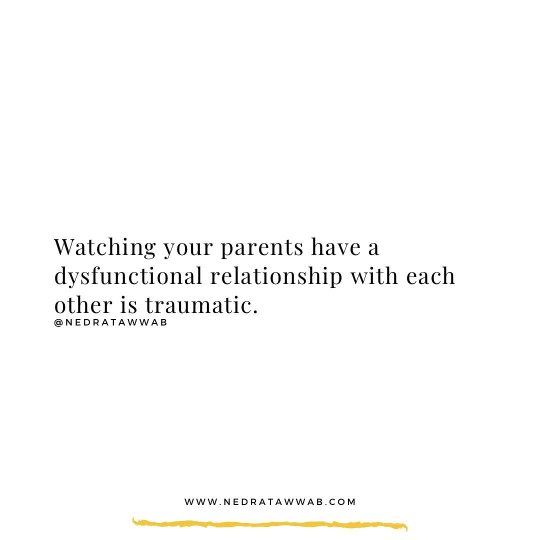


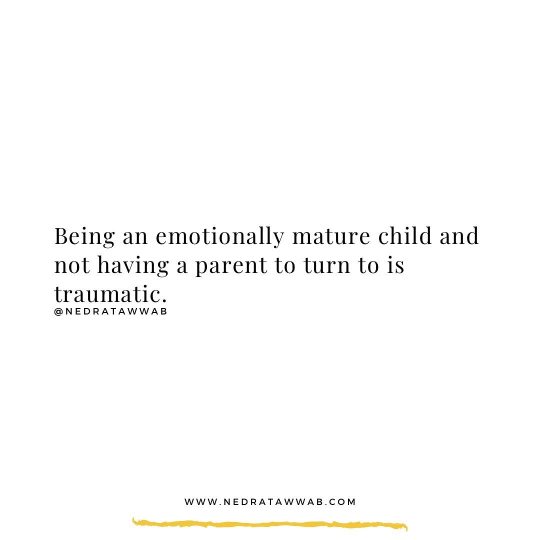

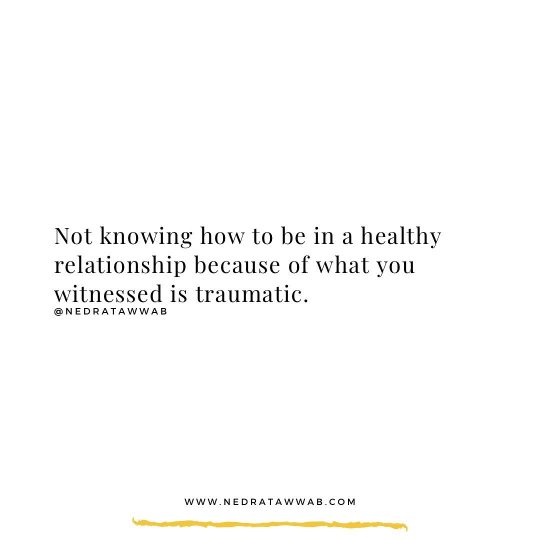
"Not knowing how to be in a healthy relationship because of what you witnessed is traumatic." This post from Nedra Tawwab hits home in so many ways. For some of us, it really hurts to discover that we don't know the first thing about relationship dynamics, how relationships are meant to work, and how to protect ourselves when dealing with other people.
Most of the times, this discovery comes about when we are interested in becoming close to another person but find ourselves deeply insecure about how we should show up to the connection, ultimately causing us to back away, or try too hard for those who are not good for us. This potentially leads us into more distressing situations, if not wholly traumatic.
#trauma#dysfunctional family#family trauma#childhood trauma#parent child relationships#life#living#dysfunctional relationships#emotions#feelings#childhood emotional abuse#childhood emotional neglect#traumatic stress#PTSD#C-PTSD#relationships#healthy relationships#unhealthy relationships#toxic relationships
382 notes
·
View notes
Text

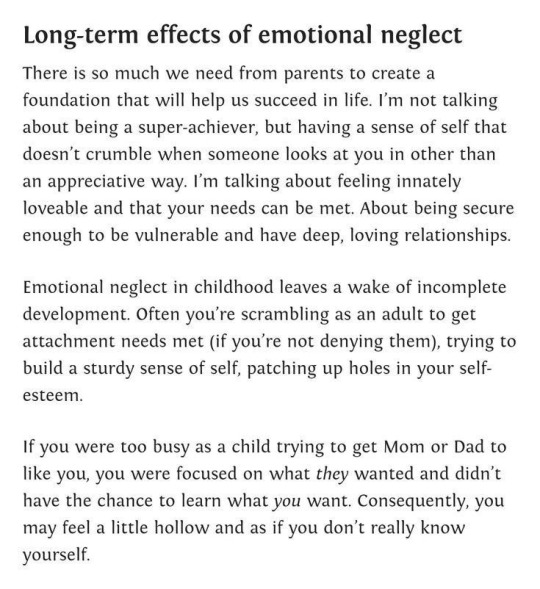
79 notes
·
View notes
Text
youtube
Childhood emotional neglect (CEN) can be hard to identify and understand, which is why today I am breaking down the symptoms we may experience in adulthood. We often focus on the signs it's happening to us, but many of us don't recognize what's going on until we are much older. These are just some of the signs, and obviously everyone's experience is unique, but just know that with help we ca over come these struggles. It can and will get better :) You are worth it. xox
#cen#childhood emotional neglect#childhood emotional abuse#self esteem#self improvement#self confidence#defensiveness#kati morton#mental health#therapy#help#psychology#mental illness#recovery#trauma#katimorton#child abuse#bad parenting#Youtube
23 notes
·
View notes
Text
Quotes from adult children of emotionally immature parents
These are passages that I've sent to myself because they stood out to me. I'm only through the first few chapters so I'll probably update with more later.
Children who feel they cannot engage their parents emotionally often try to strengthen their connection by playing whatever roles they believe their parents want them to. Although this may win them some fleeting approval, it doesn't yield genuine emotional closeness. Emotionally disconnected parents don't suddenly develop a capacity for empathy just because a child does something to please them.
People who lacked emotional engagement in childhood, men and women alike, often can't believe that someone would want to have a relationship with them just because of who they are. They believe that if they want closeness, they must play a role that always puts the other person first.
What Jake didn't realize is that hate is a normal and involuntary reaction when somebody tries to control you for no good reason. It signals that the person is extinguishing your emotional life force by getting his or her needs met at your expense.
Emotionally immature parents don't know how to validate their child's feelings and instincts. Without this validation, children learn to give in to what others seem sure about.
Like children, emotionally immature people usually end up being the center of attention. In groups, the most emotionally immature person often dominates the group's time and energy. If other people allow it, all the group's attention will go to that person, and once this happens, it's hard to redirect the group's focus. If anyone else is going to get a chance to be heard, someone will have to force an abrupt transition- something many people aren't willing to do.
It's also important to remember that old-school parenting- -the upbringing my clients' parents experienced- -was very much about children being seen but not heard. Physical punishment was not only acceptable, it was condoned, even in schools, as the way to make children responsible. For many parents, "spare the rod and spoil the child" was considered conventional wisdom. They weren't concerned about children's feelings; they saw parenting as being about teaching children how to behave. It wasn't until 1946 that Dr. Benjamin Spock, in the original version of his mega-seller The Common Sense Book of Baby and Child Care, widely popularized the idea that children's feelings and individuality were important factors to consider, in addition to physical care and discipline. In the generations before this shift, parenting tended to focus on obedience as the gold standard of children's development, rather than thinking about supporting children's emotional security and individuality.
It may be that many emotionally immature people weren't allowed to explore and express their feelings and thoughts enough to develop a strong sense of self and a mature, individual identity. This made it hard for them to know themselves, limiting their ability to engage in emotional intimacy. If you don't have a basic sense of who you are as a person, you can't learn how to emotionally engage with other people at a deep level. This arrested self-development gives rise to additional, deeper personality weaknesses that are common among emotionally immature people, as outlined in this chapter.
Instead of learning about themselves and developing a strong, cohesive self in early childhood, emotionally immature people learned that certain feelings were bad and forbidden. They unconsciously developed defenses against experiencing many of their deeper feelings. As a result, energies that could have gone toward developing a full self were instead devoted to suppressing their natural instincts, resulting in a limited capacity for emotional intimacy.
Emotionally immature people who are otherwise intelligent can think conceptually and show insight as long as they don't feel too threatened in the moment. Their intellectual objectivity is limited to topics that arent emotionally arousing to them. This can be puzzling to their children, who experience two very different sides to their parents: sometimes intelligent and insightful, other times narrow-minded and impossible to reason with.
All [types of emotionally immature parents] use nonadaptive coping mechanisms that distort reality rather than dealing with it (Vaillant 2000). And all use their children to try to make themselves feel better, often leading to a parent-child role reversal and exposing their children to adult issues in an overwhelming way. In addition, all four types have poor resonance with other people's feelings. They have extreme boundary problems, either getting too involved or refusing to get involved at all. Most tolerate frustration poorly and use emotional tactics or threats rather than verbal communication to Bet what they want.
As summarized in their 1974 article, these researchers rated mothers behaviors toward their babies on four dimensions: sensitivity-insensitivity, acceptance-rejection, cooperation interference, and accessible-ignoring. They found that a mother's "degree of sensitivity" was "a key variable, in the sense that mothers who rated high in sensitivity also, without exception, rated high in acceptance, co operation and accessibility, whereas mothers who rated low in any one of the other three scales also rated low in sensitivity" (1974, 107). Ainsworth and her colleagues reported that more sensitive mothers had babies who showed more secure attachment behaviors in their experiments.
#adult children of emotionally immature parents#childhood emotional neglect#cptsd#childhood emotional abuse#trauma#mental health
10 notes
·
View notes
Text
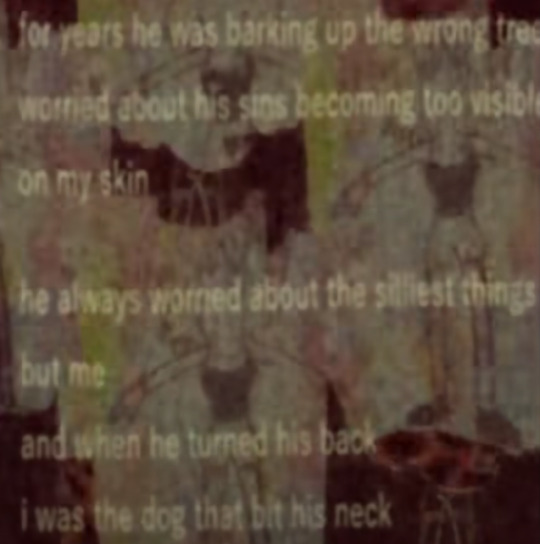
"for years he was barking up the wrong tree
worried about his sins becoming too visible
on my skin
he always worried about the silliest things
but me
and when he turned his back
i was the dog that bit his neck"
lacey's petshop - 2007 flash game, ghosttundra
#tw implied csa#she gets it#lacey games#lacey's flash games#lacey's petshop#ghosttundra#childhood trauma#trauma#csa survivor#childhood sa#childhood abuse#abuse survivor#physical abuse#childhood emotional abuse#childhood physical abuse
46 notes
·
View notes
Text
does anyone else here have a weird connection to intelligence? i really try not to define myself after something that literally cant be changed by me but theres something about it and IQ scores where im like "if im very intelligent then i hold a lot of value."
i hate it and i want to get it out of my head but it feels like i looked into Pandora's box and now i cant get it out of my head anymore..
#did system#osdd system#pdid system#trauma response#childhood trauma#childhood emotional neglect#childhood emotional abuse
24 notes
·
View notes
Text
I feel worthless its embarrassing I even think I'm allowed to utilize space around me.
4 notes
·
View notes
Text
Emotional Trauma in Childhood -2
Emotional Trauma in Childhood -2
Emotional Trauma in Childhood -2
Emotional Trauma in Childhood; the second of 3 Seminars with Dr. Rubie
Impact of Parental Emotional Abuse on Adulthood
The incidence of childhood emotional trauma is real as is outlined in the text, “Impact of Parental Emotional Abuse in Adulthood.” There are adults who are still being affected by parental emotional bruises and some scars which are left behind.…

View On WordPress
1 note
·
View note
Text
Mfw it literally takes an AskReddit Tiktok about signs someone was emotionally abused to realize I was, indeed, emotionally abused as a child.

#on the path to healing now ig...#vent#emotional abuse#childhood emotional abuse#gimme that mental illness back!! my dad gave it to me!!!#time for bed lol#its like 1 am#don't doom scroll at night... u may semi regret it lmao
0 notes
Text
Just when you marry and have a child and are financially stable and excercise every day and are so joyful in life…..
Childhood trauma comes back like a bitch. Will anyone ever want me? Will this hurt ever leave me? Am I debtor to this, for the crime of being the youngest? The Forgotten One? The only girl in the house at that time?
What did I do?
Someone tell me what I did wrong so I can earn the love I need to be given in order to be included?
I guess you can’t run from your childhood, because that 9 year old grieving girl with matted hair and dirty clothes and no shoes will find you wherever you are.
Just like loneliness itself.
#poetry#but not really#trauma#childhood trauma#childhood neglect#childhood emotional neglect#childhood emotional abuse#tw trauma#tw grief#tw depressing thoughts#tw depressing stuff#personal#sad#currently listening to#come over by Noah Kahan#which is enhancing my cry sesh rn#thanks Noah ur cash money for that brother !!!
0 notes
Text

How many times have you ended up in something you wish you had had the strength to say no to?
Source: Dr. Glenn Doyle
#neglect#emotions#feeling#childhood trauma#childhood emotional abuse#childhood emotional neglect#life#living#trauma response#boundaries#healthy boundaries#reminder#gentle reminder#saying no
182 notes
·
View notes
Text
youtube
What is childhood emotional abuse? There is childhood emotional abuse and there is childhood emotional neglect, while they may be similar, they do have some differences. I just made a video about childhood emotional neglect which I'll link below. Childhood trauma may manifest into ptsd or other unhealthy behaviors if not dealt with -- such as codependency, unhealthy relationship patterns, dissociation, addiction among many other things. In this video I will also talk you through what childhood trauma may look like then and today, and how to begin your healing process from childhood abuse or trauma. Whether you experienced physical abuse or emotional abuse by your mother, your father, your primary caregiver or even another member who had a significant parental force in your life, or a sister or a brother, you can still experience the effects of this abuse into adulthood. So beginning a childhood emotional trauma, ptsd or abuse healing journey is important and vital for a free life.
9 signs you experienced childhood emotional neglect: https://youtu.be/_A62I3kFZnM
#emotional abuse#childabuse#childhood emotional neglect#childhood emotional abuse#help#mental health#psychology#kati morton#mental illness#trauma#actually ptsd#complex ptsd#ptsd#domestic abuse#abuse#Youtube
4 notes
·
View notes
Text
Invalidating your own trauma
A "nugget" from a recent therapy session that I keep coming back to...
My therapist said that a good way to look at your own trauma is through the lens of someone who didn't experience it that way.
Because our childhood trauma is normal to us, as it's often all we knew as kids as we're often in cultural bubbles. So our friends, cousins, etc often have similar childhoods to our own, so it can feel like that's what almost the whole world is like. But it's not, of course.
They said that when someone had a mom that drank everyday, they often will feel like 'everyones' mom drank too often/too much. And they can point to things like how you can walk into retail stores and find baby onesies that say "I'm the reason mommy needs wine." to show that it is "normal" to drink all the time. So they might feel like having a mother with a drinking problem is something they shouldn't have trauma over. But to me, someone who had a mom who almost never drank, and who I have literally never seen drunk even once - it's SO understandable to me that having your mom rely on drinking as a coping method, or worse - be an outright drunk, could be scary and damaging. They are going to lack emotional presence, you may not feel like they are 'in control' in the ways they should be, you might be afraid of them, you might feel like you have to step up to take care of things when they're drinking. You are likely to think its normal/healthy to use alcohol do deal with big feelings rather than learning healthier methods. Of course that's traumatic!
And for me..."normal" is having a parent who doesn't ever connect with you on a deep emotional level, who regularly is frustrated with you for needing anything from them, it's feeling emotionally alone your whole childhood, not going to anyone as a child when bad things happened to you because you knew the support wasn't there. It's being desperate to be 'good' and a severe people pleaser yet still routinely getting yelled at and otherwise punished for making age-appropriate, human mistakes despite trying your best. It's having to shut down your feelings regularly as you weren't allowed to be angry, hurt or sad in most cases but especially cases that involved your parents' behavior, and being ignored or rejected on the few instances where you were so desperate as to ask for help. It's walking on eggshells to try to avoid angering the adults in your lives because if they got upset, you couldn't feel safe.
I have no idea how common it is. But there are people who grew up with parents who they could go to when they had a problem with a friend at school. Or when they were scared of the dark. Or when they were sexually abused. Or when they started their period for the first time. There are children who grow up being taught how to feel their feelings not shut them down or avoid them. Who don't think twice about taking up space, because they've never had routine experiences that taught them that they needed to be 'small' to be safe. And those people would see my idea of 'normal' childhood and go gosh, of course that is damaging! Maybe even 'I can't imagine having been a child and not feeling like I could turn to my parents when I was scared/hurt/upset! That's wild!" rather than be like me and think 'that's just how it is, I shouldn't be hurt by this.'
#childhood trauma#cptsd#my posts#therapy#childhood emotional abuse#childhood emotional neglect#developmental trauma#insecure attachment#attachment trauma
15 notes
·
View notes
Text

“Mouthful of Forevers”, Clementine von Radics
#not mine#dark poetry#dark literature#vent poetry#poetry#tw trauma#trauma vent#emotional abuse#tw abuse#childhood trauma#daddy issues#borderline personality disorder#bpd blog#bpd vent#actually borderline#quiet borderline#deep quotes#dark academia poetry#classic literature
16K notes
·
View notes
Text
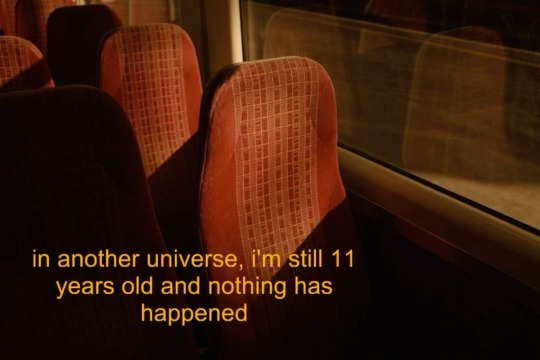
By 11 shit was already fucked up
So I would be still 5 I guess
#sadnees#tw depressing thoughts#depressing shit#i'm sad#tw depressing stuff#depressing life#childhood trauma#quotes#poetic#childhood#childhood ptsd#childhood truama#inner child#child abuse#tw abuse#emotional abuse#generational truama#truamacore#wound tw#tw ptsd#ptsd vent#complex ptsd#toxic parents#i am in pain#this is a cry for help#abandoned#kill my life#daddy issues#is it too much to ask#just why
2K notes
·
View notes